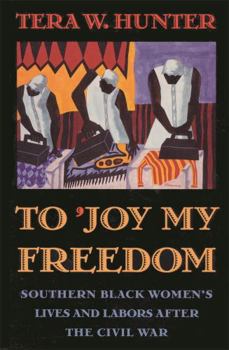To 'Joy My Freedom: Southern Black Women's Lives and Labors After the Civil War
Select Format
Select Condition 
Book Overview
As the Civil War drew to a close, newly emancipated black women workers made their way to Atlanta--the economic hub of the newly emerging urban and industrial south--in order to build an independent and free life on the rubble of their enslaved past. In an original and dramatic work of scholarship, Tera Hunter traces their lives in the postbellum era and reveals the centrality of their labors to the African-American struggle for freedom and justice...
Format:Paperback
Language:English
ISBN:0674893085
ISBN13:9780674893085
Release Date:September 1998
Publisher:Harvard University Press
Length:336 Pages
Weight:1.05 lbs.
Dimensions:0.9" x 6.1" x 9.4"
Customer Reviews
2 ratings
African-American History
Published by Thriftbooks.com User , 15 years ago
A wonderful book for anyone interested in women's rights and the struggles they have endured over the years for pay equity and equality. This book traces the newly freed slave women; their battle to survive on the paltry sums ex-slave masters paid them, the women's determination to organize strikes for a living wage. This book also depicts the efforts for control over the very bodies of ex-slave women even down to efforts to restrict their right to dance and 'joy their Freedom. The consensus that partying and dancing would restrict the women's ability to do a good day's work. But the truth was the desire to control and re-enslave these women by controlling their very bodies.
A worthy read
Published by Thriftbooks.com User , 24 years ago
Although it is not perfect, Hunter provides an engrossing look at southern black women's labor (especially in Atlanta) from the end of the Civil War to the Great Migration. With emancipation, these women searched for identity as free women, as paid workers, and as African Americans. White woutherners developed institutions and laws to restrict the newfound freedom black southerners sought to enjoy. Black women workers responded through community awareness and activism, showing intelligence and the desire to better their lives. Hunter's innovative use of sources shapes her work and helps the women's voices come alive. Because of limited African-Americal literacy in the early Reconstruction period, Hunter turned to newspapers and white southners' diaries fo flesh-out black women's experiences. Although problematic, the attention given in them to black women domestics demonstrated the division of both race and gender. Hunter also incorporates unique sources like dance steps so show the many ways newly freed women sought to define themselves. Her haunting use of illustrations reinforces the oppression and struggle for freedom black women laborers faced. As someone who knew very little about this aspect of history, Hunter's work has developed my interest in this time.





